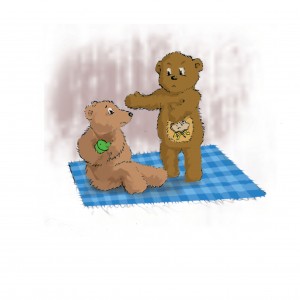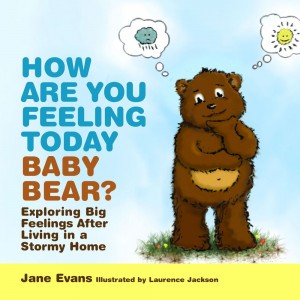Jane Evans, trauma parenting specialist and author of How Are You Feeling Today Baby Bear? writes about the importance of helping children who have experienced domestic abuse or other trauma to identify and talk about their feelings.
Early years children affected by domestic violence need help to find the words for their big feelings sooner rather than later.
Being able to recognise how we feel at any given moment is essential to our well-being, decision making and the way we relate to others and behave every day. Being able to understand and put into words our own feelings and those of others is also essential for our mental health and safety, never more so than when we are children. If a child can’t recognise the signs in their body of fear, anxiety, frustration, excitement and joy then they will struggle to tell the difference between them and this can make them vulnerable.

When it comes to children who have lived through domestic violence, or other trauma, matching words to their feelings and their bodily state, as early as possible, is even more vital. Post domestic violence, children need to be able to make some sense of the things they have seen, heard, felt, smelt, and even tasted. Without support to learn to do this, their emotional memories will remain unprocessed within them which will affect all aspects of their onward journey, especially their physical and mental health.
For any child being able to understand the emotions they have means they can feel less overwhelmed by them. Anyone who has seen a pre or early verbal child get frustrated because they can’t make you understand they wanted the purple cup and not the green one you have given them, will know what I mean! They may become distressed but not have the words to describe their inner state and how much the purple cup means to them and this can escalate in to an emotional overload of frustration, or they will learn to give up and switch off from trying to communicate their distress, which is never a good thing.
For those living and working with children who have, or may have, lived with domestic violence, How are you feeling today Baby Bear?, has been created to begin this vital work of enabling the children to find a voice. It can also be used sensitively in situations where an assessment of a child’s view of how they felt at home needs to be known and considered to for their future or immediate well-being and safety, such as a safeguarding or court based assessment.
Gentle suggestion and exploration done patiently and sensitively can begin the process of filling a child’s ‘feelings machine’. Imagine a Las Vegas style slot machine as being the child, adults keep pulling the handle down to get a ‘pay out’ of feelings. “Tell me how you feel about hitting your brother/being in trouble at school/being in time out again?” “How do you think I feel about hearing you hurt someone again/didn’t do as you were asked again/finding your torn up book?” The handle is pulled repeatedly but as no one has put any dollars in the machine there are none to pay out. However, each time we explore and name a feeling with even a tiny baby, “oh I think you might be sad/worried/cross/excited”, we put a dollar in the slot machine then eventually there can be a ‘pay out!’
In homes where adults are involved in domestic violence, one carrying it out and the other trying to avoid it and protect themselves and their children from it, there is no time to have every day feelings based conversations. Once the family is safely out of it the feelings work needs to begin gently and in small ways as soon as is possible. Young children’s brains are developing and wiring up very rapidly based on what they experience and are exposed too. Connecting words to the signals their body is giving them is vital to enabling them to sort through and regulate feelings which are too big for them to live with in a healthy way.
How are you feeling today Baby Bear? is designed to be a tool to begin this important work with young children to enable their early year’s mental and emotional development to give them a better emotionally informed foundation for life. It is a gentle book which gives permission, insight and those all-important words to children who need to begin to process their memories of feeling frightened and confused so they can get on with being children.
You can find out more about Jane’s work, upcoming events and read more of her blog posts on her website: http://www.parentingposttrauma.co.uk/
You can also follow her on twitter: @janeparenting
I see children in my Play Therapy practice who have suffered domestic violence, and they find it very difficult to talk about their feelings. Playing those feelings out helps them cope. I like the sound of this book because it will give me a chance to address them gently about this issue.